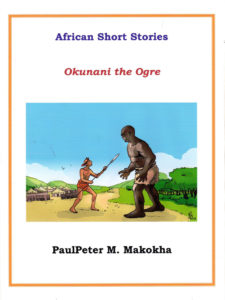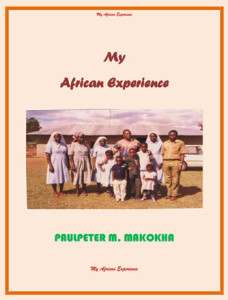My Books
 African Short Stories
African Short Stories
PaulPeter M. Makokha
“I am very confident whoever reads the book will love it since it brings out aspects of the African culture that most don’t know about! High schoolers will also love it…They may never have been to Africa but they will get a rough idea of our cultures.” – PaulPeter M. Makokha
Order Paul’s eBook today!
(You will receive the book via email after payment)
$30.00
 My African Experience
My African Experience
Summary of “My African Experience”:
My African Experience has been written by PaulPeter M. Makokha. The author gives a detailed account of real-life experiences. The book is basically a summary of events spread across three decades. The experiences include: how he—together with his siblings—was brought up, the good- and bad times, et cetera. It is a book worth buying given that most of the experiences shared are unique to the African socio-cultural context. The author will be grateful for each copy of the book bought. He wishes to register his gratitude in advance. God Bless You.
Order Paul’s eBook today!
(You will receive the book via email after payment)
$20.00
My Articles
The Perceptions of Tanzanian Youths towards Cross-Border Marriages within East Africa: The Case of St. Augustine University of Tanzania, Arusha Centrepaper writing service
PaulPeter M. Makokha
Cross-border marriages, referred to in this research study as transnational marriages, involved spouses from two different countries living together as husband and wife. The aim of this study was to unearth the perceptions of Tanzanian youths towards cross-border marriages within East Africa. The study sampled participants from one of the Kenya-Tanzania border towns, namely, Arusha. A sample size of 384 was drawn from St. Augustine University of Tanzania – Arusha Centre’s student population size of 780. Multiple research methods were used to collect data for this study. The findings indicate that 30 percent gave adverse views on cross-border marriages within East Africa while 48 percent had favourable views. However, 22 percent were unsure. We conclude that those who favoured cross-border marriages within East African were more than those who were against.
Read Full Article: http://iiste.org/Journals/index.php/PPAR/article/view/32813
Characteristics of Cottage Industries in Kakamega County, Kenya
PaulPeter M. Makokha
Cottage industries are the home-based units of production which rely on human- or animal-propelled skills and technology. They are characterized by accessibility to raw materials, low costs of operation, and proximity to markets. The cottage industries highlighted in this research paper are: pottery, crude sugar production, brick-making, liquor production, quarrying and masonry, carpentry, traditional medicine production, charcoal production, basketry and weaving, baking, bicycle repair, flour-grinding, and shoe-making and repair.
Read Full Article: http://www.macrothink.org/journal/index.php/ijhrs/article/view/6621
The Place of Home-Based Industries in Rural Kenya’s Socio-Economic Progress: A Case Study of Kakamega County
PaulPeter M. Makokha
Home-based industries, also referred to as cottage industries, are those units of production that are mostly located in homesteads, and which rely on human- or animal-propelled skills and technology. The home-based industries focused on in this academic paper are: pottery, crude sugar production, brick-making, liquor production, quarrying and masonry, carpentry, traditional medicine production, charcoal production, basketry and weaving, baking, bicycle repair, flour-grinding, and shoe-making and repair. These industries provide skill training and development, products for rural and urban consumption, employment opportunities, and contribute to development. The socio-economic contribution of home-based industries in rural Kenya is highlighted in this research paper.
Read Full Article: http://www.iiste.org/Journals/index.php/JEDS/article/view/18680
Impediments to the Growth of Cottage Industries in Kakamega County, Kenya
PaulPeter M. Makokha
Cottage industries play a significant role in Kenya’s socio-economic development. However, a number of obstacles inhibit their growth. This research paper, which employed an exploratory research design, unearths these impediments. The major challenges cited by potters, crude sugar producers, brick-makers, liquor producers, masons, carpenters, traditional medicine persons, charcoal producers, weavers, bakers, bicycle repairers, flour-grinders, and shoe-makers and repairers in Kakamega County were: inadequate capital, competition, lack of ready market, scarcity of raw materials and unfavourable weather.
Read Full Article: http://www.iiste.org/Journals/index.php/DCS/article/view/19102

